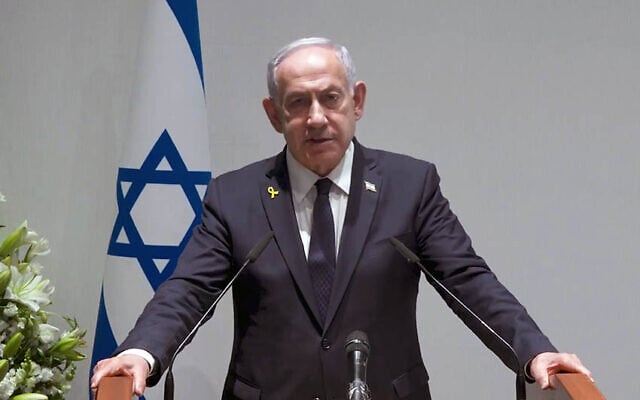On a tense day in the ever-volatile Middle East, Israeli Prime Minister Benjamin Netanyahu issued a stark ultimatum to Qatar, demanding that the Gulf state either expel or prosecute leaders of the Palestinian militant group Hamas residing within its borders. In a statement that reverberated across diplomatic channels and media outlets, Netanyahu declared that if Qatar fails to comply, Israel will take matters into its own hands. This bold pronouncement has raised eyebrows, intensified regional tensions, and sparked debates about the implications for Qatar, Israel, Hamas, and the broader Middle Eastern geopolitical landscape.
The Context of the Warning
To fully understand the significance of Netanyahu’s warning, it is essential to delve into the intricate web of relationships, conflicts, and interests that define the Israel-Palestinian conflict and Qatar’s unique role in it. The small but affluent Gulf state of Qatar has long positioned itself as a mediator in regional conflicts, leveraging its wealth, strategic location, and diplomatic agility to play an outsized role in Middle Eastern affairs. Home to the Al Jazeera media network and a key U.S. military base, Al Udeid, Qatar has cultivated a reputation as a neutral broker, hosting peace talks and facilitating negotiations in conflicts ranging from Afghanistan to Gaza.
Hamas, the Palestinian Islamist organization that governs the Gaza Strip, has maintained a significant presence in Qatar for years. Several high-ranking Hamas leaders, including members of its political bureau, are believed to reside in Doha, the Qatari capital. This arrangement has been tolerated—some would argue encouraged—by Qatar, which views its hosting of Hamas as part of its broader strategy to act as a mediator between Israel and Palestinian factions. Qatar has provided financial aid to Gaza, often with Israel’s tacit approval, to alleviate humanitarian crises and stabilize the region. However, this delicate balancing act has frequently drawn criticism from Israel and its allies, who accuse Qatar of indirectly supporting terrorism by providing a safe haven for Hamas leaders.
Netanyahu’s warning comes at a time of heightened tensions in the region. The Israeli-Palestinian conflict has seen periodic escalations, with recent years marked by intermittent violence in Gaza, the West Bank, and Jerusalem. Hamas, designated as a terrorist organization by Israel, the United States, the European Union, and others, has been a central player in these conflicts, launching rocket attacks on Israeli territory and engaging in armed resistance against Israeli forces. Israel, in turn, has responded with military operations, airstrikes, and blockades aimed at neutralizing Hamas’s capabilities.
The timing of Netanyahu’s statement is not coincidental. Domestic political pressures in Israel, including ongoing debates about security and the handling of the Palestinian issue, may have prompted the prime minister to adopt a hardline stance. Netanyahu, a veteran politician known for his hawkish policies, has often used strong rhetoric to rally domestic support and project strength on the international stage. By targeting Qatar, a key regional player, he may also be seeking to shift focus from internal challenges, such as coalition dynamics or economic concerns, to an external threat.
Qatar’s Role in the Israeli-Palestinian Conflict
Qatar’s involvement in the Israeli-Palestinian conflict is multifaceted. Unlike other Gulf states that have normalized relations with Israel through the Abraham Accords, Qatar has maintained a more cautious approach, prioritizing its role as a mediator over formal diplomatic ties with Israel. This stance has allowed Qatar to engage with both Israeli officials and Palestinian factions, including Hamas, in ways that few other countries can.
Since the early 2000s, Qatar has provided significant financial and humanitarian aid to Gaza, often channeling funds through Hamas’s political leadership. These funds, which amount to hundreds of millions of dollars, have been used to pay salaries for public sector workers, provide electricity, and support infrastructure projects in the blockaded territory. While Israel has allowed these transfers to proceed—viewing them as a means to prevent a humanitarian collapse in Gaza that could lead to further instability—it has also expressed unease about Qatar’s close ties to Hamas.
Qatar’s hosting of Hamas leaders is a particularly contentious issue. Figures such as Khaled Meshaal, the former head of Hamas’s political bureau, and Ismail Haniyeh, another senior leader, have been based in Doha for years. Qatar argues that their presence enables it to facilitate dialogue between Hamas and other parties, including Israel, Egypt, and the United States. For example, Qatar played a key role in brokering ceasefires during previous rounds of violence between Israel and Hamas, including the 2014 Gaza War and subsequent flare-ups.
However, Israel views the presence of Hamas leaders in Doha with suspicion. From Jerusalem’s perspective, Qatar’s hospitality provides these leaders with a safe haven from which they can coordinate attacks, raise funds, and plan strategies against Israel. Netanyahu’s warning reflects a growing frustration within Israel that Qatar’s mediation efforts, while valuable in some contexts, may inadvertently embolden Hamas by allowing its leaders to operate with impunity.
The Legal and Political Dimensions of the Ultimatum
Netanyahu’s demand that Qatar either expel or prosecute Hamas leaders raises complex legal and political questions. Expelling Hamas leaders would require Qatar to reconsider its long-standing policy of hosting them, a move that could strain its relations with Palestinian factions and other regional actors. Prosecution, on the other hand, is fraught with legal challenges. Qatar does not designate Hamas as a terrorist organization, unlike many Western countries, and its legal system may not provide a clear framework for prosecuting individuals based on activities conducted outside its borders.
Moreover, Qatar’s sovereignty is a critical factor. As an independent nation, Qatar is unlikely to respond favorably to what it may perceive as an external dictate from Israel. Doha has historically resisted pressure from other powers, including during the 2017-2021 Gulf crisis, when Saudi Arabia, the United Arab Emirates, Bahrain, and Egypt imposed a blockade on Qatar, partly over its support for Islamist movements like Hamas. Qatar’s defiance in that instance, bolstered by support from Turkey and Iran, suggests that it may not easily capitulate to Israel’s demands.
Netanyahu’s threat that Israel will “act” if Qatar fails to comply introduces an additional layer of complexity. While the prime minister did not specify what actions Israel might take, the statement implies the possibility of targeted operations, such as assassinations or cyberattacks, against Hamas leaders in Qatar. Such actions would be highly provocative, potentially violating Qatar’s sovereignty and straining Israel’s relations with other Gulf states and the United States. The presence of the Al Udeid airbase, a critical hub for U.S. military operations in the region, further complicates the situation, as any Israeli action in Qatar could have repercussions for U.S.-Qatari relations.
Regional and International Reactions
The international community has reacted cautiously to Netanyahu’s warning, with many capitals wary of the potential for escalation. The United States, a close ally of both Israel and Qatar, finds itself in a delicate position. Washington has long supported Qatar’s mediation efforts, recognizing their value in stabilizing Gaza and preventing broader conflicts. At the same time, the U.S. shares Israel’s concerns about Hamas and has designated it as a terrorist organization. The Biden administration is likely to urge restraint, seeking to avoid a diplomatic crisis that could undermine its broader Middle East strategy.
Egypt, another key mediator in the Israeli-Palestinian conflict, may also be affected by Netanyahu’s ultimatum. Cairo has worked closely with Qatar to broker ceasefires and facilitate aid to Gaza, and any shift in Qatar’s stance toward Hamas could complicate these efforts. Similarly, Turkey, which also hosts Hamas leaders and maintains close ties with Qatar, may view Israel’s warning as a challenge to its own regional influence.
The Palestinian Authority (PA), based in the West Bank, has a fraught relationship with Hamas and may see Netanyahu’s warning as an opportunity to weaken its rival. However, the PA is also wary of actions that could further destabilize Gaza or undermine Palestinian unity. Public opinion in the Arab world, meanwhile, is likely to be divided, with some supporting Qatar’s mediation role and others criticizing its ties to Hamas.
The Broader Implications for the Middle East
Netanyahu’s ultimatum is not just about Hamas or Qatar; it reflects broader shifts in the Middle Eastern geopolitical landscape. The Abraham Accords, signed in 2020, marked a significant realignment, with countries like the United Arab Emirates, Bahrain, and Morocco normalizing relations with Israel. These agreements have isolated Qatar to some extent, as its refusal to join the accords has highlighted its divergent approach to the Israeli-Palestinian conflict.
At the same time, Qatar’s growing influence in the region—bolstered by its energy wealth, media presence, and diplomatic initiatives—makes it a formidable player. Doha’s ability to navigate complex relationships with Iran, Turkey, the United States, and various non-state actors like Hamas has allowed it to punch above its weight. However, this influence comes with risks, as Qatar’s balancing act could falter if it is perceived as too closely aligned with any one side.
For Israel, the ultimatum underscores the challenges of dealing with non-state actors like Hamas in a region where state sovereignty, international law, and power politics intersect. While Israel has the military and intelligence capabilities to target Hamas leaders abroad, doing so in a country like Qatar would carry significant risks, including diplomatic fallout and potential retaliation from Hamas or its allies.
Historical Precedents and Israel’s Approach to Hamas
Israel has a long history of targeting Hamas leaders beyond its borders. In 1997, Israeli agents attempted to assassinate Khaled Meshaal in Amman, Jordan, in an operation that went awry and led to a diplomatic crisis with Jordan. The incident, which involved the use of a poisoned injection, forced Israel to provide an antidote and release Hamas prisoners in exchange for the return of its captured agents. More recently, Israel has been linked to targeted killings of Hamas operatives in places like Dubai and Lebanon, often using sophisticated intelligence and covert operations.
These historical precedents suggest that Israel is not bluffing when it threatens to act against Hamas leaders in Qatar. However, the context has changed since the 1990s. Qatar’s status as a U.S. ally and a key player in regional diplomacy makes it a less straightforward target than other locations. Any Israeli operation in Doha would need to weigh the potential consequences for Israel’s broader strategic interests, including its relationships with the United States and other Gulf states.
The Humanitarian Angle: Gaza’s Plight
At the heart of this diplomatic standoff lies the ongoing humanitarian crisis in Gaza. The territory, home to over two million Palestinians, has been under an Israeli-Egyptian blockade since Hamas took control in 2007. The blockade, coupled with repeated military conflicts, has devastated Gaza’s economy, infrastructure, and healthcare system. Unemployment is rampant, clean water is scarce, and electricity is limited to a few hours a day.
Qatar’s financial aid to Gaza has been a lifeline for many residents, helping to avert a total collapse of the territory’s economy. However, critics argue that this aid, by flowing through Hamas, strengthens the group’s grip on power and undermines efforts to achieve a lasting political solution. Israel’s demand that Qatar expel or prosecute Hamas leaders could disrupt this aid, potentially exacerbating the humanitarian crisis and fueling further unrest.
The Path Forward: Diplomacy or Confrontation?
As the world watches this unfolding drama, the question remains: what is the path forward? For Qatar, the choice is not straightforward. Expelling Hamas leaders could undermine its role as a mediator and alienate Palestinian factions, while prosecuting them may be legally and politically unfeasible. Ignoring Israel’s warning, however, risks escalating tensions and potentially inviting Israeli action on Qatari soil.
For Israel, the ultimatum reflects a broader strategy of applying maximum pressure on Hamas and its supporters. Yet, this approach carries risks, including the possibility of alienating allies and destabilizing the region further. A more diplomatic approach, such as engaging Qatar and other mediators to address Hamas’s activities, could yield better results without the risks of unilateral action.
The international community, particularly the United States and Egypt, has a critical role to play in de-escalating the situation. By facilitating dialogue between Israel and Qatar, these actors could help find a solution that addresses Israel’s security concerns while preserving Qatar’s mediation role and ensuring continued support for Gaza’s population.
Conclusion
Israeli Prime Minister Benjamin Netanyahu’s warning to Qatar marks a significant escalation in the ongoing Israeli-Palestinian conflict, with far-reaching implications for the region. By demanding that Qatar expel or prosecute Hamas leaders, Israel is challenging a key pillar of Qatar’s foreign policy and testing the limits of its own influence in the Middle East. The outcome of this standoff will depend on a complex interplay of diplomacy, power politics, and regional dynamics.
As the world awaits Qatar’s response, the stakes could not be higher. A miscalculation by either side could lead to a dangerous escalation, further complicating an already intractable conflict. Yet, there is also an opportunity for dialogue and creative diplomacy to address the underlying issues driving this crisis. In a region long defined by conflict, the hope for a peaceful resolution remains elusive but not impossible.








